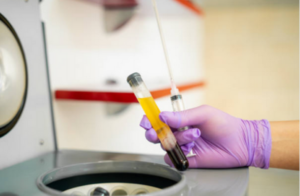What’s in a PRP Shot?
Plasma is the liquid part of your blood that’s mostly made of water and protein. It lets red and white blood cells and platelets move through your bloodstream. Platelets are a type of blood cell that makes your blood clot. They also play a role in healing.
Doctors may use platelet-rich plasma (PRP) on injuries or damage to tendons, ligaments, muscles, joints, and skin.
To collect plasma, a doctor draws blood from your body and uses a machine to separate the platelet-rich plasma from the rest of the blood. Then the doctor numbs the area of your body being treated with PRP injections. Once you’re numb, the doctor uses a needle to inject your plasma into the area of your body being treated.
What Can Platelet-Rich Plasma Treat?
PRP injections are used to treat torn tendons, tendinitis, muscle injuries, arthritis-related pain, and joint injuries. They’re becoming more common for cosmetic procedures, too. For example, dermatologists and hair replacement experts use PRP injections to treat a type of hair loss called androgenic alopecia, also known as male or female pattern baldness, which affects men and women. And some dermatologists provide PRP treatments for the face. (You may have heard these called a “vampire facial.”)
Do Platelet-Rich Plasma Injections Work?
So far, research shows that it speeds healing after injury or surgery for certain conditions, like torn tendons. In addition to helping injured tissue heal, some studies show PRP injections curb pain and boost mobility for people with rotator cuff injuries. PRP injections appear to reduce hair loss in people with male or female pattern baldness. But it’s not clear whether facial PRP injections ease visible signs of aging, like wrinkles and sagging skin.
It can take several weeks for PRP injections to start working. For some conditions, particularly those affecting the hair or the skin, it may take up to 6 months to notice the full effects. For some conditions, including hair loss, you may need to repeat the procedure to maintain the results.
Before You Get PRP Injections
You’ll likely need to stop taking certain medications that thin your blood, like aspirin and ibuprofen, before you get PRP injections. You may also need to take a break from certain vitamins or supplements, such as omega-3 fatty acids. Your doctor can tell you exactly what you need to do to prepare for these shots.
- Abnormal platelet function or a low platelet count
- Anemia
- Cancer
- An infection
You should only get PRP injections from a licensed doctor.

